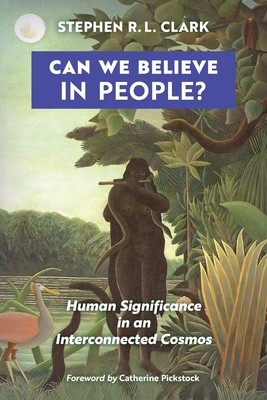
- We will send in 10–14 business days.
- Author: Stephen R L Clark
- Publisher: Angelico Press
- ISBN-10: 1621385094
- ISBN-13: 9781621385097
- Format: 15.2 x 22.9 x 1.4 cm, minkšti viršeliai
- Language: English
- SAVE -10% with code: EXTRA
Reviews
Description
"In our current anomie, such a book has never been more urgently needed to reinvigorate our intuition that reality, our long-desired home, is one of coruscating beauty."--SIMON CONWAY MORRIS
The view that humanity is "in the image and likeness of God" has influenced the past two millennia of European history, and retains its significance despite the apparent decline of theism as a major social factor. Human beings are understood to be in some way "special," deserving of "respect," capable of understanding (even remaking) the universe. The aim of the author--drawing on a wide range of resources ancient and modern--is to clearly delineate this its apparent justifications, its implications, and what can and should be said to challenge it. Such a perspective seems necessary if we are to believe "human reason" fit to explain the cosmos or intuit true moral principles. But then again, how can we be anything very special if our axioms and deepest feelings are at bottom nothing more than creaturely acquisitions gained through Darwinian evolution, in the same way that so many other creatures, with different axioms and feelings, have managed "well enough," both here and perhaps elsewhere in a cosmos vastly larger and stranger than our predecessors supposed? In short, Can We Believe in People? preserves a strong account of human reason and human dignity while yet fully acknowledging the claims of other terrestrial and extraterrestrial life.
EXTRA 10 % discount with code: EXTRA
The promotion ends in 23d.00:55:09
The discount code is valid when purchasing from 10 €. Discounts do not stack.
- Author: Stephen R L Clark
- Publisher: Angelico Press
- ISBN-10: 1621385094
- ISBN-13: 9781621385097
- Format: 15.2 x 22.9 x 1.4 cm, minkšti viršeliai
- Language: English English
"In our current anomie, such a book has never been more urgently needed to reinvigorate our intuition that reality, our long-desired home, is one of coruscating beauty."--SIMON CONWAY MORRIS
The view that humanity is "in the image and likeness of God" has influenced the past two millennia of European history, and retains its significance despite the apparent decline of theism as a major social factor. Human beings are understood to be in some way "special," deserving of "respect," capable of understanding (even remaking) the universe. The aim of the author--drawing on a wide range of resources ancient and modern--is to clearly delineate this its apparent justifications, its implications, and what can and should be said to challenge it. Such a perspective seems necessary if we are to believe "human reason" fit to explain the cosmos or intuit true moral principles. But then again, how can we be anything very special if our axioms and deepest feelings are at bottom nothing more than creaturely acquisitions gained through Darwinian evolution, in the same way that so many other creatures, with different axioms and feelings, have managed "well enough," both here and perhaps elsewhere in a cosmos vastly larger and stranger than our predecessors supposed? In short, Can We Believe in People? preserves a strong account of human reason and human dignity while yet fully acknowledging the claims of other terrestrial and extraterrestrial life.


Reviews